英语语法一般将来时
- 格式:ppt
- 大小:967.00 KB
- 文档页数:17

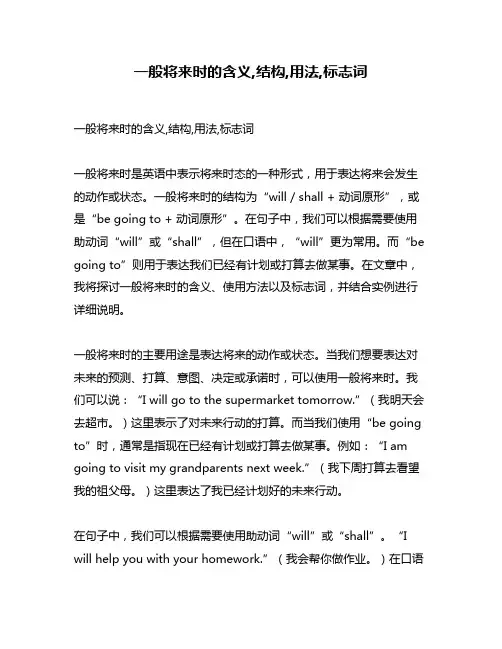
一般将来时的含义,结构,用法,标志词一般将来时的含义,结构,用法,标志词一般将来时是英语中表示将来时态的一种形式,用于表达将来会发生的动作或状态。
一般将来时的结构为“will / shall + 动词原形”,或是“be going to + 动词原形”。
在句子中,我们可以根据需要使用助动词“will”或“shall”,但在口语中,“will”更为常用。
而“be going to”则用于表达我们已经有计划或打算去做某事。
在文章中,我将探讨一般将来时的含义、使用方法以及标志词,并结合实例进行详细说明。
一般将来时的主要用途是表达将来的动作或状态。
当我们想要表达对未来的预测、打算、意图、决定或承诺时,可以使用一般将来时。
我们可以说:“I will go to the supermarket tomorrow.”(我明天会去超市。
)这里表示了对未来行动的打算。
而当我们使用“be going to”时,通常是指现在已经有计划或打算去做某事。
例如:“I am going to visit my grandparents next week.”(我下周打算去看望我的祖父母。
)这里表达了我已经计划好的未来行动。
在句子中,我们可以根据需要使用助动词“will”或“shall”。
“I will help you with your homework.”(我会帮你做作业。
)在口语中,“will”更为常用,而“shall”通常只用于第一人称(I 和we)的疑问句和请求句中。
例如:“Shall we go to the cinema tonight?”(我们今晚去看电影好吗?)另外,标志词也是使用一般将来时的重要标志。
“tomorrow”(明天)、“next week”(下周)、“soon”(很快)、“in the future”(在未来)等词汇在句子中表示了动作或状态将要发生的时间。
一般将来时是英语中用于表示将来时态的一种形式,可以通过“will / shall + 动词原形”或是“be going to + 动词原形”进行构成。
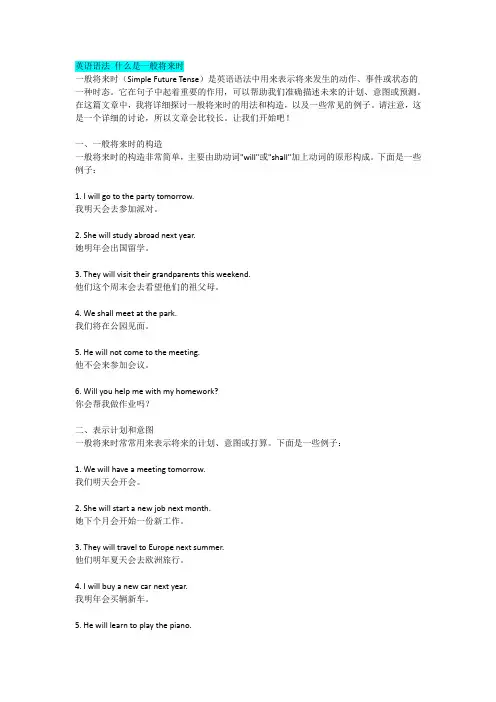
英语语法什么是一般将来时一般将来时(Simple Future Tense)是英语语法中用来表示将来发生的动作、事件或状态的一种时态。
它在句子中起着重要的作用,可以帮助我们准确描述未来的计划、意图或预测。
在这篇文章中,我将详细探讨一般将来时的用法和构造,以及一些常见的例子。
请注意,这是一个详细的讨论,所以文章会比较长。
让我们开始吧!一、一般将来时的构造一般将来时的构造非常简单,主要由助动词"will"或"shall"加上动词的原形构成。
下面是一些例子:1. I will go to the party tomorrow.我明天会去参加派对。
2. She will study abroad next year.她明年会出国留学。
3. They will visit their grandparents this weekend.他们这个周末会去看望他们的祖父母。
4. We shall meet at the park.我们将在公园见面。
5. He will not come to the meeting.他不会来参加会议。
6. Will you help me with my homework?你会帮我做作业吗?二、表示计划和意图一般将来时常常用来表示将来的计划、意图或打算。
下面是一些例子:1. We will have a meeting tomorrow.我们明天会开会。
2. She will start a new job next month.她下个月会开始一份新工作。
3. They will travel to Europe next summer.他们明年夏天会去欧洲旅行。
4. I will buy a new car next year.我明年会买辆新车。
5. He will learn to play the piano.他会学弹钢琴。
6. We shall visit our friends in the evening.我们晚上会去拜访我们的朋友。
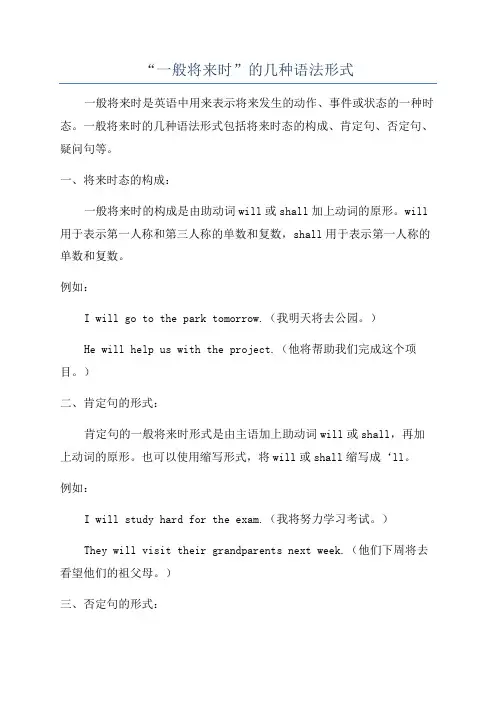
“一般将来时”的几种语法形式一般将来时是英语中用来表示将来发生的动作、事件或状态的一种时态。
一般将来时的几种语法形式包括将来时态的构成、肯定句、否定句、疑问句等。
一、将来时态的构成:一般将来时的构成是由助动词will或shall加上动词的原形。
will 用于表示第一人称和第三人称的单数和复数,shall用于表示第一人称的单数和复数。
例如:I will go to the park tomorrow.(我明天将去公园。
)He will help us with the project.(他将帮助我们完成这个项目。
)二、肯定句的形式:肯定句的一般将来时形式是由主语加上助动词will或shall,再加上动词的原形。
也可以使用缩写形式,将will或shall缩写成‘ll。
例如:I will study hard for the exam.(我将努力学习考试。
)They will visit their grandparents next week.(他们下周将去看望他们的祖父母。
)三、否定句的形式:否定句的一般将来时形式是由主语加上助动词will not或won’t,再加上动词的原形。
例如:I will not go to the party tonight.(我今晚不去参加派对。
)四、疑问句的形式:疑问句的一般将来时形式是将助动词will或shall置于主语之前。
例如:Will you join us for dinner?(你会和我们一起吃晚餐吗?)Shall we go to the movies?(我们去看电影好吗?)五、其他形式:除了will和shall之外,一般将来时还可以使用一些其他词组来表示将来的动作、事件或状态。
例如be going to,be about to等。
1. be going to+动词原形be going to+动词原形表示计划、打算、意图或预测将要发生的事情。
例如:She is going to travel around the world next year.(明年她将要周游世界。
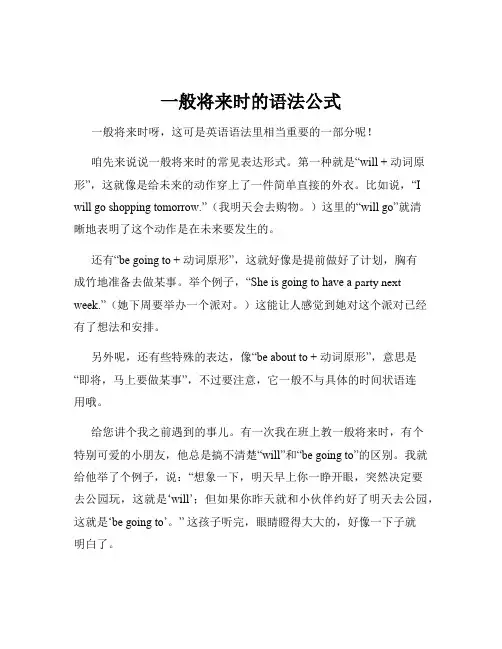
一般将来时的语法公式一般将来时呀,这可是英语语法里相当重要的一部分呢!咱先来说说一般将来时的常见表达形式。
第一种就是“will + 动词原形”,这就像是给未来的动作穿上了一件简单直接的外衣。
比如说,“I will go shopping tomorrow.”(我明天会去购物。
)这里的“will go”就清晰地表明了这个动作是在未来要发生的。
还有“be going to + 动词原形”,这就好像是提前做好了计划,胸有成竹地准备去做某事。
举个例子,“She is going to have a party next week.”(她下周要举办一个派对。
)这能让人感觉到她对这个派对已经有了想法和安排。
另外呢,还有些特殊的表达,像“be about to + 动词原形”,意思是“即将,马上要做某事”,不过要注意,它一般不与具体的时间状语连用哦。
给您讲个我之前遇到的事儿。
有一次我在班上教一般将来时,有个特别可爱的小朋友,他总是搞不清楚“will”和“be going to”的区别。
我就给他举了个例子,说:“想象一下,明天早上你一睁开眼,突然决定要去公园玩,这就是‘will’;但如果你昨天就和小伙伴约好了明天去公园,这就是‘be going to’。
” 这孩子听完,眼睛瞪得大大的,好像一下子就明白了。
咱再深入聊聊一般将来时的用法。
一般将来时可以用来表示将来要发生的动作或者存在的状态。
比如说,“The weather will be better tomorrow.”(明天天气会更好。
)这就是对未来天气的一种预测。
在使用一般将来时的时候,要注意时间状语的搭配。
像“tomorrow”(明天)、“next week”(下周)、“in the future”(在未来)等等,这些都能帮助我们更准确地表达未来的时间。
而且呀,一般将来时在实际交流中可重要了!比如你和朋友约好周末一起看电影,你就会说:“We will watch a movie this weekend.” 要是你提前买好了票,有了具体的计划,那就是“We are going to watch a movie this weekend.” 这样就能很清楚地让对方知道你的安排啦。
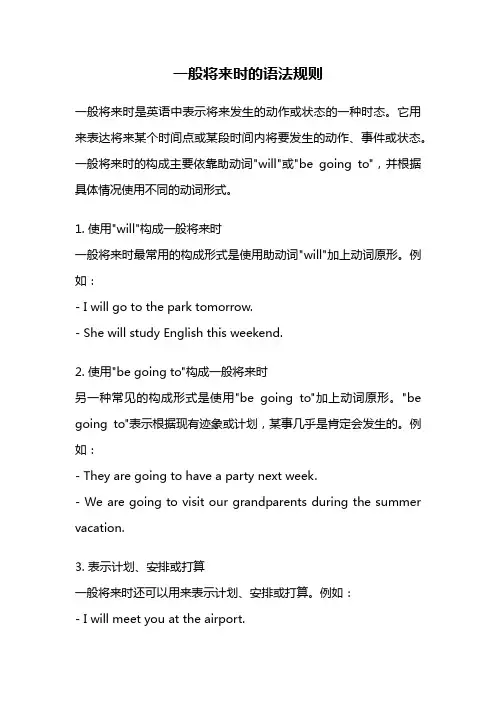
一般将来时的语法规则一般将来时是英语中表示将来发生的动作或状态的一种时态。
它用来表达将来某个时间点或某段时间内将要发生的动作、事件或状态。
一般将来时的构成主要依靠助动词"will"或"be going to",并根据具体情况使用不同的动词形式。
1. 使用"will"构成一般将来时一般将来时最常用的构成形式是使用助动词"will"加上动词原形。
例如:- I will go to the park tomorrow.- She will study English this weekend.2. 使用"be going to"构成一般将来时另一种常见的构成形式是使用"be going to"加上动词原形。
"be going to"表示根据现有迹象或计划,某事几乎是肯定会发生的。
例如:- They are going to have a party next week.- We are going to visit our grandparents during the summer vacation.3. 表示计划、安排或打算一般将来时还可以用来表示计划、安排或打算。
例如:- I will meet you at the airport.- She is going to take a vacation next month.4. 表示预测、推测或判断一般将来时还可用来表示预测、推测或判断。
例如:- It will rain tomorrow.- The price of oil is going to increase.5. 使用时间状语和频率副词在一般将来时的句子中,可以使用时间状语词或频率副词来指明动作发生的时间或频率。
例如:- He will come to the party tonight.- They are going to travel to Europe next year.6. 否定形式和疑问形式在一般将来时的句子中,要表示否定形式,只需在助动词"will"前加上"not"。
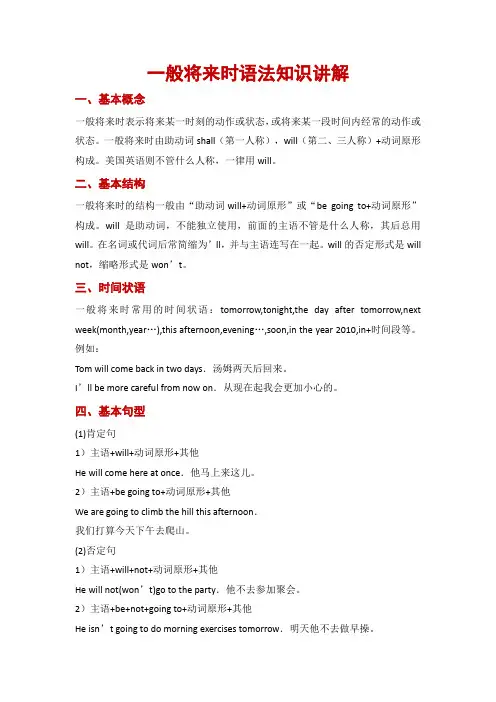
一般将来时语法知识讲解一、基本概念一般将来时表示将来某一时刻的动作或状态,或将来某一段时间内经常的动作或状态。
一般将来时由助动词shall(第一人称),will(第二、三人称)+动词原形构成。
美国英语则不管什么人称,一律用will。
二、基本结构一般将来时的结构一般由“助动词will+动词原形”或“be going to+动词原形”构成。
will是助动词,不能独立使用,前面的主语不管是什么人称,其后总用will。
在名词或代词后常简缩为’ll,并与主语连写在一起。
will的否定形式是will not,缩略形式是won’t。
三、时间状语一般将来时常用的时间状语:tomorrow,tonight,the day after tomorrow,next week(month,year…),this afternoon,evening…,soon,in the year 2010,in+时间段等。
例如:Tom will come back in two days.汤姆两天后回来。
I’ll be more careful from now on.从现在起我会更加小心的。
四、基本句型(1)肯定句1)主语+will+动词原形+其他He will come here at once.他马上来这儿。
2)主语+be going to+动词原形+其他We are going to climb the hill this afternoon.我们打算今天下午去爬山。
(2)否定句1)主语+will+not+动词原形+其他He will not(won’t)go to the party.他不去参加聚会。
2)主语+be+not+going to+动词原形+其他He isn’t going to do morning exercises tomorrow.明天他不去做早操。
(3)一般疑问句1)Will+主语+动词原形+其他?Will he help you with your English?他会帮助你学习英语吗?2)Be动词(Am,Is,Are)+主语+going to+动词原形+其他?Are you going to play computer games tomorrow afternoon?你打算明天下午玩电脑游戏吗?(4)特殊疑问句:疑问词+一般疑问句?—What will the students have for lunch today?学生们今天午饭吃什么?—They will have bread.他们将吃面包。
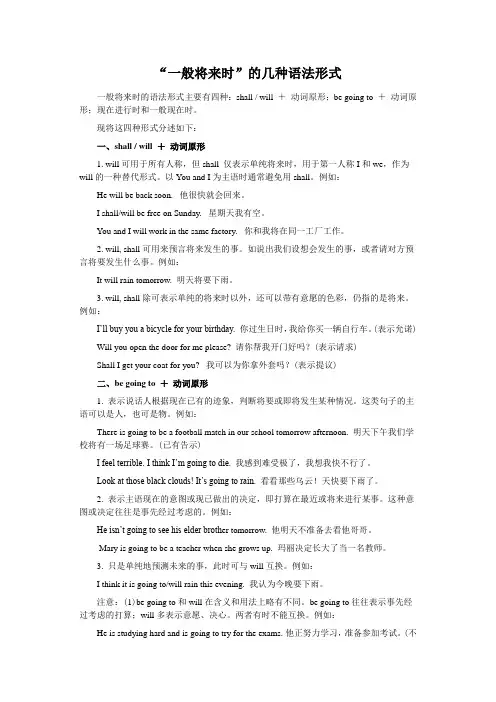
“一般将来时”的几种语法形式一般将来时的语法形式主要有四种:shall / will +动词原形;be going to +动词原形;现在进行时和一般现在时。
现将这四种形式分述如下:一、shall / will +动词原形1. will可用于所有人称,但shall 仅表示单纯将来时,用于第一人称I和we,作为will的一种替代形式。
以You and I为主语时通常避免用shall。
例如:He will be back soon. 他很快就会回来。
I shall/will be free on Sunday. 星期天我有空。
You and I will work in the same factory. 你和我将在同一工厂工作。
2. will, shall可用来预言将来发生的事。
如说出我们设想会发生的事,或者请对方预言将要发生什么事。
例如:It will rain tomorrow. 明天将要下雨。
3. will, shall除可表示单纯的将来时以外,还可以带有意愿的色彩,仍指的是将来。
例如:I’ll buy you a bicycle for your birthday. 你过生日时,我给你买一辆自行车。
(表示允诺)Will you open the door for me please? 请你帮我开门好吗?(表示请求)Shall I get your coat for you? 我可以为你拿外套吗?(表示提议)二、be going to +动词原形1. 表示说话人根据现在已有的迹象,判断将要或即将发生某种情况。
这类句子的主语可以是人,也可是物。
例如:There is going to be a football match in our school tomorrow afternoon. 明天下午我们学校将有一场足球赛。
(已有告示)I feel terrible. I think I’m going to die. 我感到难受极了,我想我快不行了。
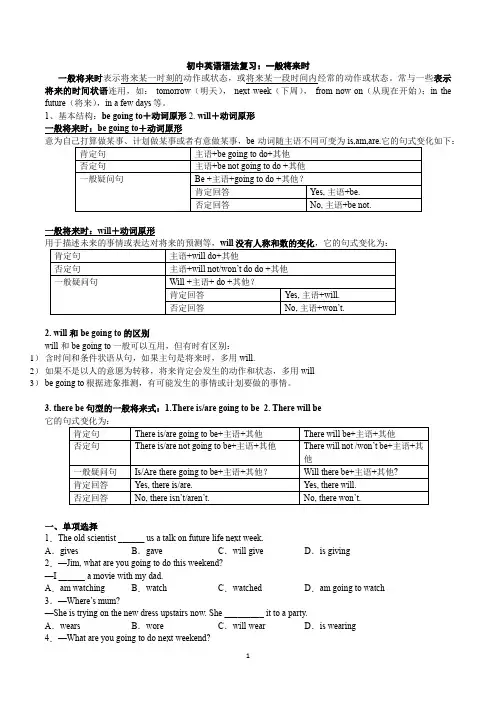
初中英语语法复习:一般将来时一般将来时表示将来某一时刻的动作或状态,或将来某一段时间内经常的动作或状态。
常与一些表示将来的时间状语连用,如:tomorrow(明天),next week(下周),from now on(从现在开始);in the future(将来),in a few days等。
1、基本结构:be going to+动词原形 2. will+动词原形一般将来时:be going to+动词原形一般将来时:will+动词原形2. will 和be going to 的区别will 和be going to一般可以互用,但有时有区别:1)含时间和条件状语从句,如果主句是将来时,多用will.2)如果不是以人的意愿为转移,将来肯定会发生的动作和状态,多用will3)be going to根据迹象推测,有可能发生的事情或计划要做的事情。
3. there be 句型的一般将来式:1.There is/are going to be 2. There will be一、单项选择1.The old scientist ______ us a talk on future life next week.A.gives B.gave C.will give D.is giving2.—Jim, what are you going to do this weekend?—I ______ a movie with my dad.A.am watching B.watch C.watched D.am going to watch3.—Where’s mum?—She is trying on the new dress upstairs now. She _________ it to a party.A.wears B.wore C.will wear D.is wearing4.—What are you going to do next weekend?—There __________ a basketball match next Sunday. I want to watch it.A.will be B.will have C.is going to have D.are going to be 5.—Which team ________ the football match?—I’m not sure. The two teams both play well. Let’s wait and see.A.wins B.won C.is winning D.will win 6.Robots ________ us do some heavy and difficult jobs in the future.A.help B.helped C.are helping D.will help7.—What are you going to do next weekend, Wang Hui?—I ________ my grandparents next Sunday.A.visit B.visitedC.am visiting D.am going to visit8.I don’t know if it ________ sunny tomorrow. If it ________ sunny, I will go fishing. A.will be; is B.is; will beC.will be; is going to be D.is; is9.We are going to have a farewell party ________.A.now B.every day C.last week D.next Friday 10.There is going to ________ a basketball match tomorrow.A.be B.have C.is D.are11.Look at the dark clouds in the sky. It ________.A.is going to rain B.rained C.raining D.rainy 12.What ________you ________for tomorrow’s party?A.did; wear B.will; wear C.do; going to wear D.do; do13.He ________ busy this week. He ________ free next week.A.is; is B.will; will be C.is; will be14.There are many black clouds in the sky. It ________ soon.A.will rain B.rains C.rained D.is raining 15.It ________ warm in Dalian tomorrow.A.will be B.is C.does16.She will ________ a book about animals after school.A.buys B.buy C.is buy D.going to buy 17.Mike ________ his room yesterday, and he is going to ________ his homework tomorrow. A.cleaned; do B.cleaned; did C.clean; do18.—Our library is bright and beautiful.—Yes. Will you ________ us ________ it?A.shows; to B.show; aroundC.shows; around D.show; to19.Look! There are a lot of clouds in the sky. It is going to _______ soon.A.rains B.rainy C.be raining D.be rainy20.Li Ming ______ a T-shirt tomorrow.A.buys B.bought C.buy D.will buy 21.Sarah and I ______ a film next Sunday. We ______ horses last Sunday.A.am going to see; rode B.are going to see; rode C.will see; ride 22.—What are you going to do this weekend?—_______A.I’m going to visit my grandparents.B.I’m fine.C.I’m watching TV.D.I’m cleaning the room.23.—Peter! What is your plan for this Sunday?—I ________ my grandmother. She is in hospital.A.visit B.am visiting C.am going to visit 24.It’s cloudy all day today, but it ________ tomorrow.A.changes B.changed C.will change D.is changing 25.—Can your sister ________?—No, she can’t. But she ________ to swim next month.A.swims; is learning B.swim; is learningC.swims; is going to learn D.swim; is going to learn26.—When ________ you come back from London, Mary?—Last week. The River Thames is really beautiful and I ________ it again.A.do; visit B.did; visit C.do; am visiting D.did; will visit 27.This is our last night in China. We ________ home tomorrow.A.will fly B.fly C.flies D.flew 28.—Schools ________ different in the future.—Yes, you are right.A.is B.are C.were D.will be 29.—Why are you in a hurry, Cindy?—There ________ a basketball match between Class One and our class at 3 o’clock.A.are going to be B.will haveC.is going to have D.will be30.Tony _________ the Great Wall with his classmates next Sunday morning.A.visited B.visits C.will visit D.visit31.There ________ a sports meeting in our school next week.A.was B.were C.are D.is going to be 32.You can borrow this film—surely you _________ watching it.A.enjoy B.enjoyed C.will enjoy D.are enjoying 33.—Why are you in such a hurry, Peter?—I________ a basketball match between Class One and our class in ten minutes.A.join in B.am joining in C.joined in D.am going to join in 34.Robots and machines people do more work in the future.A.help B.will help C.are helping D.helped 35.After this exam, you ________ a wonderful holiday next month. Take it easy!A.have B.has C.had D.will have36.If it ______ rain tomorrow, my family ______ go for a walk in the park.A.isn’t, will B.doesn’t, willC.won’t, will D.won’t be, will37.—It’s hot here.—I ________ and open the window.A.go B.went C.am going D.will go 38.—When ________ Lingling ________ litter with her friend?—Next Saturday morning.A.does; collect B.did; collect C.will; collect D.is; collecting 39.Perhaps we ________ able to connect our minds to the Internet in the future.A.are B.were C.have been D.will be 40.—What’s your plan for the new term?—I ________ English well.A.learn B.learnedC.am learning D.am going to learn41.—Are you free? I’d like you to go to the museum with me.—Sorry, there _______ some important meetings this coming weekend.A.is going to have B.will have C.are going to be D.is going to be 42.There ________ schools in the future. Students will study at home.A.is going to have B.will be C.won’t have D.won’t be 43.—How will students learn then?—They ________ by computers in the classroom.A.studies B.studied C.will study D.is studying 44.—What are you going to do, Betty?—I’m going ________ football this afternoon.A.play B.to play C.played D.playing45.We hope ________ a computer on every student’s desk in the future.A.there is B.there wasC.there will have D.there will be46.—What are you going to do this Sunday?—I ________ a picnic with my parents.A.have B.had C.am having D.am going to have 47.We hope there ________ a war in the world. Everyone can live a happy life.A.will not have B.will be not C.is not going to be D.is not going to have 48.If you interview the estate agent, he ________ you much information about housing. A.gives B.gave C.will give D.is giving 49.—The radio says it ________ rain this afternoon, isn’t it?—No. I think it will be sunny.A.will go to B.is going to C.shall go to D.will be 50.Where __________ you __________ have a meeting tomorrow?A.do; go B.will; go C.are; go D.are; going to二、完成句子51.My mother will be back in an hour. (改为否定句)My mother back in an hour.52.The students will study at home in the future. (改为一般疑问句)the students at home in the future?53.Things will be different in the future. (变为一般疑问句)things in the future?54.There is a football match at the sports hall every day.(用tomorrow改写句子)a football match at the sports hall tomorrow.55.Alice is going to do her homework this afternoon. (改为—般疑问句)Alice her homework this afternoon?56.They are going to take a walk in the park. (就划线部分提问)they to in the park?57.They will meet at the school gate at 7 a.m. on Saturday. (对画线部分提问)they at the school gate?58.I’m going to learn English well because it’s very useful.(对划线部分提问)you going to learn English well?初中英语语法复习:一般将来时答案1.C【详解】句意:下周这位老科学家将给我们做一个关于未来生活的报告。
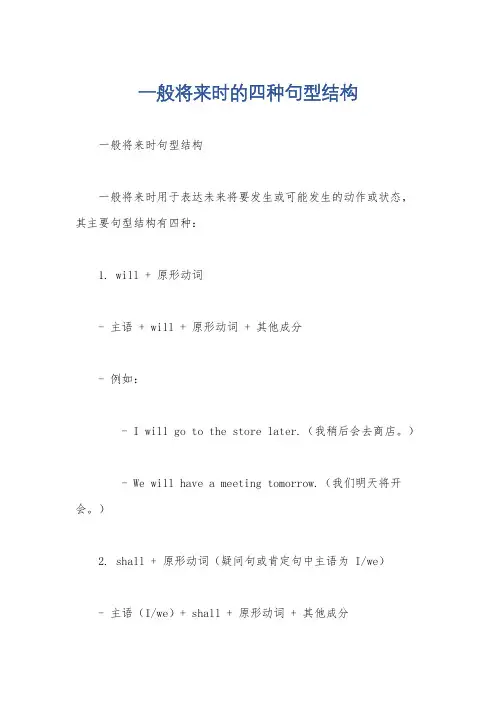
一般将来时的四种句型结构一般将来时句型结构一般将来时用于表达未来将要发生或可能发生的动作或状态,其主要句型结构有四种:1. will + 原形动词- 主语 + will + 原形动词 + 其他成分- 例如:- I will go to the store later.(我稍后会去商店。
)- We will have a meeting tomorrow.(我们明天将开会。
)2. shall + 原形动词(疑问句或肯定句中主语为 I/we)- 主语(I/we)+ shall + 原形动词 + 其他成分- 例如:- Shall I open the window?(我打开窗户好吗?)- We shall arrive at 10:00 AM.(我们将在上午 10:00 到达。
)3. be going to + 原形动词- 主语 + be going to + 原形动词 + 其他成分- 例如:- I am going to watch a movie tonight.(我今晚要去看电影。
)- They are going to build a new house.(他们打算建造一所新房子。
)4. be + about to + 原形动词- 主语 + be about to + 原形动词 + 其他成分- 例如:- I am about to leave.(我就要走了。
)- The train is about to depart.(火车就要出发了。
)一般将来时的用途一般将来时主要用于以下几种情况:- 表达未来将要发生的肯定动作或事件- 表达未来可能发生的动作或事件- 表示计划或打算- 表达预测或推测- 表示请求或建议(使用 shall 时)- 表示承诺或保证(使用 will 时)。
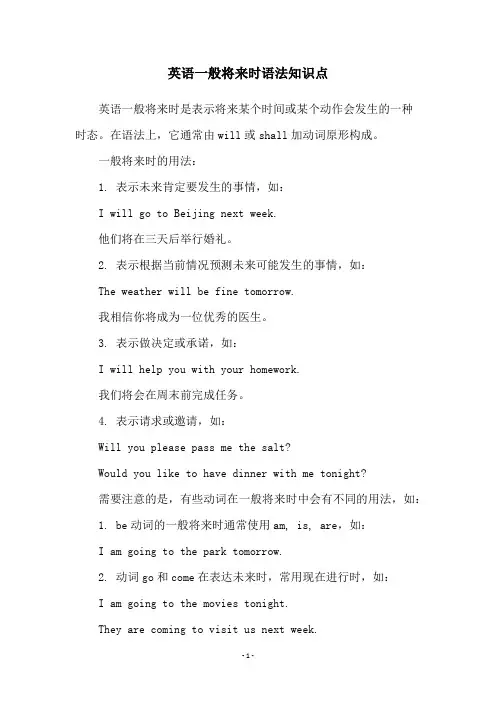
英语一般将来时语法知识点
英语一般将来时是表示将来某个时间或某个动作会发生的一种
时态。
在语法上,它通常由will或shall加动词原形构成。
一般将来时的用法:
1. 表示未来肯定要发生的事情,如:
I will go to Beijing next week.
他们将在三天后举行婚礼。
2. 表示根据当前情况预测未来可能发生的事情,如:
The weather will be fine tomorrow.
我相信你将成为一位优秀的医生。
3. 表示做决定或承诺,如:
I will help you with your homework.
我们将会在周末前完成任务。
4. 表示请求或邀请,如:
Will you please pass me the salt?
Would you like to have dinner with me tonight?
需要注意的是,有些动词在一般将来时中会有不同的用法,如:
1. be动词的一般将来时通常使用am, is, are,如:
I am going to the park tomorrow.
2. 动词go和come在表达未来时,常用现在进行时,如:
I am going to the movies tonight.
They are coming to visit us next week.
3. 动词表示意愿、建议、命令等语气时,将来时可以用should,如:
You should take a break and relax.
以上是英语一般将来时的基本语法知识点,希望对大家学习英语有所帮助。
英语语法一般将来时有哪些常见的例子一般将来时(Simple Future Tense)是英语语法中用来表示将来发生的动作、事件或状态的一种时态。
在句子中,一般将来时通常使用助动词"will"或"shall"加上动词原形来构成。
下面是一些常见的例子,展示了一般将来时的用法:1. 表示将来的计划和意图:- I will go to the movies tomorrow night.- She shall finish her homework before dinner.- We will have a meeting next week.2. 表示预测和推测:- It will rain tomorrow.- They won't win the game.- He shall be the next president.3. 表示承诺和决心:- I will help you with your project.- She shall study harder for the exam.- We will never forget this moment.4. 表示习惯或经常性的动作:- He will always wake up early in the morning.- They shall usually have dinner together.- We will often visit our grandparents.5. 表示请求或邀请:- Will you pass me the salt, please?- Shall we go for a walk?- Will you join us for dinner?6. 表示意愿和愿望:- I will travel the world one day.- She shall become a famous singer.- We will make a difference in the world.需要注意的是,一般将来时也可以与时间状语连用,以明确表示将来的时间点。
一般将来时表示将来某个时间要发生的动作或存在的状态,也表示将来经常或反复发生的动作。
常常与表示将来的时间状语连用。
常用的表达形式共有五种,现归纳如下:一、用will或shall表示。
助动词will或shall+动词原形这一形式,表示将来发生的事情,用于征求对方的意见或表示客气的邀请。
在口语中will用于所有人称,书面语中第一人称常用shall。
如:1. Tomorrow will be Sunday. 明天就是星期天。
2. The rain will stop soon. 雨很快就要停了。
3. Shall we go there at five? 我们五点钟去那儿,好吗?4. Will you please open the door? 请你把门打开,好吗?二、用be going to结构表示。
be going to+动词原形用来表示近期或事先考虑过的将要发生的动作以及已有迹象表明必将发生某事,意为打算;就要。
如:1. Were going to meet outside the school gate. 我们打算在校门口见面。
2. Look! Its going to rain. 瞧!快下雨了。
三、用现在进行时表示。
表示位置转移的动词(如:go, come, leave, start, arrive等),可用现在进行时表示将来时。
如:1. Uncle Wang is coming. 王叔叔就要来了。
2. Theyre leaving for Beijing. 他们即将前往北京。
四、用一般现在时表示。
根据规定或时间表预计要发生的动作,在时间和条件状语从句中,都可用一般现在时表示将来时。
如:1. The new term starts (begins) on August 29th. 新学期八月二十九日开学。
2. If it doesnt rain tomorrow, we will go out for a picnic. 如果明天不下雨,我们将出去野餐。
一般将来时的表达形式一般将来时(Simple Future Tense)是英语语法中的一个时态,用于表达将来某个时间发生的动作或状态。
本文将介绍一般将来时的三种常见表达形式。
1. 使用助动词 "will"一种常见的表达一般将来时的方式是使用助动词 "will"。
它的构成是:主语 + will + 动词原形。
例如:- I will finish my homework tonight.(我今晚会完成作业。
)- She will meet her friends at the cinema tomorrow.(她明天会在电影院见朋友。
)- They will travel to Europe next month.(他们下个月会去欧洲旅行。
)此外,也可以使用 "will not" 或 "won't" 来表示否定形式。
例如:- We won't go to the party this weekend.(我们这个周末不会去参加派对。
)2. 使用 be going to + 动词原形另一种表示一般将来时的方式是使用 "be going to" 结构。
它的构成是:主语 + be (am/is/are) + going to + 动词原形。
例如:- They are going to visit their grandparents next week.(他们下周要去拜访他们的祖父母。
)- I am going to learn how to play the piano.(我打算学习弹钢琴。
)- She isn't going to eat fast food anymore.(她不再打算吃快餐了。
)该结构也可以用于否定形式,只需在 "be" 后加 "not"。
一般将来时语法总结归纳一般将来时是英语语法中常用的时态之一,表示将来某个时间发生的动作或存在的状态。
本文将总结一般将来时的使用规则和相关的注意事项。
一、一般将来时的构成一般将来时由“will / shall + 动词原形”构成,其中“will”适用于所有人称,而“shall”仅适用于第一人称(I 和 we)。
例如:1. I will go shopping tomorrow.(我明天要去购物。
)2. He shall arrive at 5 p.m.(他将于下午5点到达。
)二、一般将来时的用法1. 表示自愿、决心或承诺一般将来时经常用于表示自愿、决心或承诺的动作。
例如:1. I will help you with your homework.(我愿意帮助你做作业。
)2. He will never smoke again.(他决心再也不抽烟了。
)2. 表示预测、推测或预计一般将来时可用于表达预测、推测或预计的动作或状态。
例如:1. It will rain tomorrow.(明天会下雨。
)2. They will probably win the game.(他们很可能会赢得比赛。
)3. 表示习惯或反复发生的动作一般将来时可以用来表示根据过去的行为或事件推断将来会发生的动作。
例如:1. He will often call his parents.(他通常会给父母打电话。
)2. They will always eat dinner at home.(他们总是在家吃晚餐。
)4. 表示请求、邀请或建议一般将来时也可用于表示请求、邀请或建议的动作。
例如:1. Will you please close the window?(请你关上窗户好吗?)2. Shall we meet at the café?(我们要在咖啡馆见面吗?)三、注意事项1. 否定形式将"will not"缩写为"won't",放在动词之前。